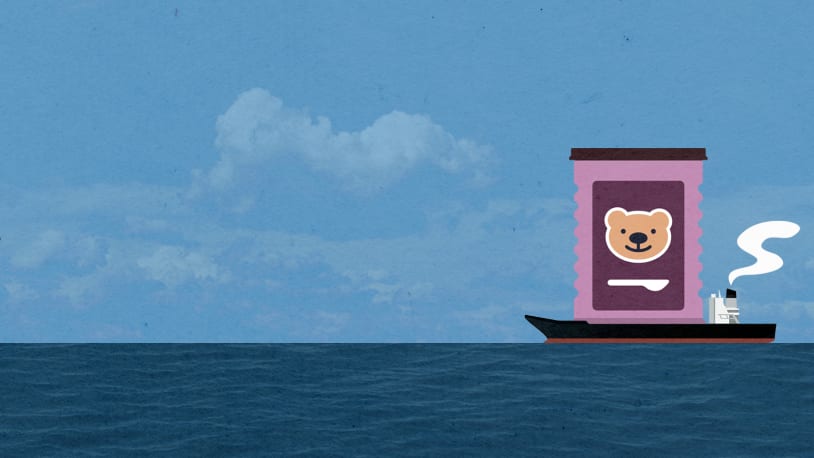
Why on Earth doesn’t America import baby formula?
A U.S. C-17 military transport plane carrying more than 70,000 pounds of Nestlé’s Alfamino Infant and Alfamino Junior baby formula from Switzerland arrived in Indianapolis from Germany on Sunday. More big shipments of formula from Europe are on the way in the coming days under the Biden administration’s Operation Fly Formula.
President Biden signed an executive order authorizing the military to fly in crates of baby formula last week, as part of a broader plan to ease a nationwide shortage, fast. Why is the Pentagon suddenly involved in the baby formula import-export business? Because normally, the U.S. barely imports any formula from abroad. Here’s everything you need to know:
How much baby formula does the U.S. typically import?
About 2 percent, mostly from Mexico, Ireland, and the Netherlands. The other 98 percent is made in the U.S., primarily by four large producers: Abbott Nutrition, which controls 48 percent of the $2.1 billion U.S. market by itself; Mead Johnson Nutrition, owned by conglomerate Reckitt Benckiser; Nestlé USA and its Gerber subsidiary; and Perrio, which makes generic formula for retailers. A safety closure at Abbott’s primary formula plant in Sturgis, Michigan, is the proximate cause of today’s shortage.
Why doesn’t the U.S. import more formula?
A combination of regulatory and trade policies, with a dash of market monopolization and a bit of safety concerns. To start, the Food and Drug Administration has approved very few formulas for import. “FDA regulation of formula is so stringent that most of the stuff that comes out of Europe is illegal to buy here due to technicalities like labeling requirements,” Derek Thompson writes at The Atlantic. Formula may end up on the FDA’s “red list” of products to be seized, The New York Times explains, if it has “labels that are not written in English or do not have all of the required nutrients listed.”
The U.S. also slaps “tariffs and quotas — some that predate the Trump and Biden administrations, but others that were worsened in recent years” — on imported formula, Eric Boehm reports at Reason. “Imports of infant formula are subject to tariff-rate quotas of 17.5 percent after certain thresholds are met. As the name suggests, tariff-rate quotas are meant to be set high enough that they effectively block additional imports by making it unprofitable to pay the tariff.”
The Trump administration tightened the market even further in its refreshed North American Free Trade Agreement, limiting Canada to a certain amount of exported formula before it adds a surcharge. If Canada exports more than 40,480 metric tons of formula anywhere in the world in a year, all of its formula exports become more expensive. “The new duties seemingly closed off Canada as a source of infant formula,” Fortune reports. “The U.S. imported a grand total of zero tons of baby formula from its northern neighbor in 2021, yet has shipped tons of domestic formula into Canada.”
This wasn’t exactly a surprise.
The dairy quotas were “likely a way for the Trump administration to snipe at China, after a Chinese-based company had invested $225 million in a formula manufacturing facility in Canada,” Reason‘s Boehm writes. “The deal was also a win for American dairy farmers and the Trump administration.”
Is European baby formula safe?
For the most part, yes. “Regulations governing the manufacture and labeling of formula are ostensibly designed to protect the safety of U.S. infants,” NPR News reports. “But they also serve to protect the domestic formula companies from overseas competition.”
“To find out just how different European formulas are from U.S. versions, and to see whether they meet FDA guidelines, Anthony Porto, a pediatric gastroenterologist and pediatrics professor at Yale University, led a study to analyze European formulas,” Wirecutter reports. “Porto’s team did find that European formulas generally meet most of the FDA nutritional guidelines, even if the foreign formulas are not FDA-approved. The opposite is not always the case,” because Europe bans the use of corn syrup and other sugars used in many U.S.-made formulas.
At the same time, Porto’s team and the American Academy of Pediatrics do warn of safety risks with foreign-made formula, including that “the instructions for some European formulas are written in Dutch or German, making it tough for English-speaking parents to prepare the formulas properly,” Wirecutter reports. And buyers won’t be as aware of safety recalls of foreign formulas, ABC News adds. “Infants have become sick or died from tainted formula products manufactured outside the U.S.”
But overall, “it’s clear that the U.S. has basically closed off its market to imports,” Mary Lovely, a senior fellow at the Peterson Institute for International Economics, tells NPR News. “There’s really no reason we should be blocking perfectly nutritional formula coming out of high-quality, sanitary plants in the European Union,” she adds. “There is no reason why we can’t be importing baby formula from Canadian plants, which could very easily be inspected by FDA.”
“America’s reasonable instinct to protect infants has metastasized into an unreasonably protectionist trade policy that makes the U.S. formula market exquisitely sensitive to existential shocks (like a pandemic) and domestic shocks (like a major recall),” The Atlantic‘s Thompson argues. “Today, the shocks are everywhere, and that’s why baby formula is not.”
A U.S. C-17 military transport plane carrying more than 70,000 pounds of Nestlé’s Alfamino Infant and Alfamino Junior baby formula from Switzerland arrived in Indianapolis from Germany on Sunday. More big shipments of formula from Europe are on the way in the coming days under the Biden administration’s Operation Fly Formula. President Biden signed an executive order…
A U.S. C-17 military transport plane carrying more than 70,000 pounds of Nestlé’s Alfamino Infant and Alfamino Junior baby formula from Switzerland arrived in Indianapolis from Germany on Sunday. More big shipments of formula from Europe are on the way in the coming days under the Biden administration’s Operation Fly Formula. President Biden signed an executive order…